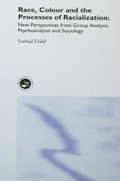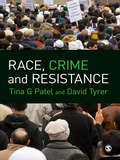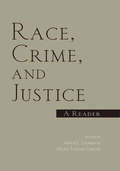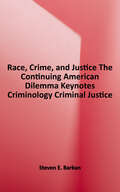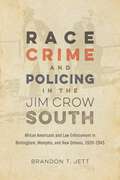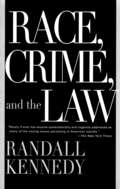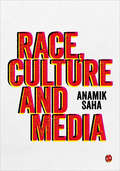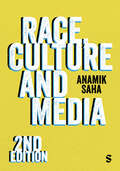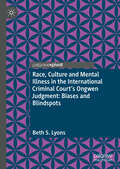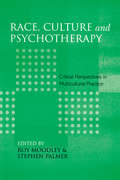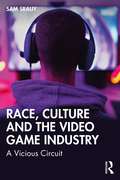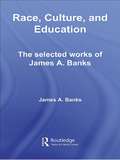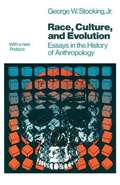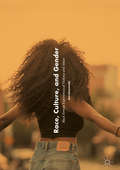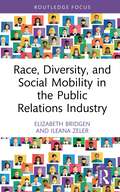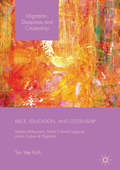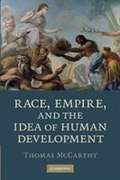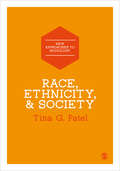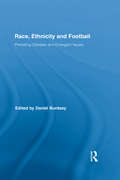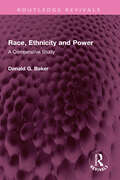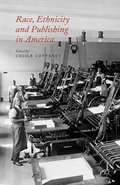- Table View
- List View
Race, Colour and the Processes of Racialization: New Perspectives from Group Analysis, Psychoanalysis and Sociology
by Farhad DalalIs racial conflict determined by biology or society?So many conflicts appear to be caused by racial and ethnic differences; for example, the cities of Britain and America are regularly affected by race riots. It is argued by socio-biologists and some schools of psychoanalysis that our instincts are programmed to hate those different to us by evolutionary and developmental mechanisms. This book argues against this line, proposing an alternative drawing on insights from diverse disciplines including anthropology, social psychology and linguistics, to give power-relations a critical explanatory role in the generation of hatreds. Farhad Dalal argues that people differentiate between races in order to make a distinction between the 'haves' and 'must-not-haves', and that this process is cognitive, emotional and political rather than biological. Examining the subject over the past thousand years, Race, Colour and the Processes of Racialisation covers:* psychoanalytic and other theories of racism* a new theorisation of racism based on group analytic theory* a general theory of difference based on the works of Fanon, Elias, Matte-Blanco and Foulkes* application of this theory to race and racism.Farhad Dalal concludes that the structures of society are reflected in the structures of the psyche, and both of these are colour coded. This book will be invaluable to students, academics and practitioners in the areas of psychoanalysis, group analysis, psychotherapy and counselling.
Race, Crime and Resistance
by David Tyrer Tina PatelIn a post-Macpherson, post-9/11 world, criminal justice agencies are adapting their responses to criminal behaviour across diverse ethnic groups. Race, Crime and Resistance draws on contemporary theory and a range of case studies to consider racial inequalities within the criminal justice system and related organisations. Exploring the mechanisms of discrimination and exclusion, the book goes beyond superficial assumptions to examine the ensuing processes of mobilisation and resistance across disadvantaged groups. Empirically grounded and theoretically informed, the book critically unpicks the persisting concepts of race and ethnicity in the perceptions and representations of crime. Articulate and sensitive, the book clarifies complex ideas through the use of chapter summaries, case studies, further reading and study questions. It is essential reading for students and scholars of criminology, race and ethnicity, and sociology.
Race, Crime, and Justice: A Reader
by Shaun L. Gabbidon Helen Taylor GreeneA comprehensive collection of the essential writings on race and crime, this important Reader spans more than a century and clearly demonstrates the long-standing difficulties minorities have faced with the justice system. The editors skillfully draw on the classic work of such thinkers as W.E.B. DuBois and Gunnar Myrdal as well as the contemporary work of scholars such as Angela Davis, Joan Petersilia, John Hagen and Robert Sampson. This anthology also covers all of the major topics and issues from policing, courts, drugs and urban violence to inequality, racial profiling and capital punishment. This is required reading for courses in criminology and criminal justice, legal studies, sociology, social work and race.
Race, Crime, and Justice: The Continuing American Dilemma (Keynotes in Criminology and Criminal Justice)
by Steven E. BarkanBrief, timely, and accessible, Race, Crime, and Justice: The Continuing American Dilemma examines many critical issues including why, over the past few decades, African Americans, Latinos, and Native Americans were swept into jails and prisons at rates far beyond their share of the national population. Steven E. Barkan explores racial/ethnic disparities in criminal justice involvement; discrimination in policing, prosecution, and sentencing; the rise and collateral consequences of mass incarceration; racial bias in news media coverage of crime; racial/ethnic differences in rates of criminal behavior and victimization; and social and criminal justice policies that, if successfully implemented, would help correct many of the injustices in the criminal justice system. About the Series Keynotes in Criminology and Criminal Justice provides essential knowledge on important contemporary matters of crime, law, and justice to a broad audience of readers. Volumes are written by leading scholars in that area. Concise, accessible, and affordable, these texts are designed to serve either as primers around which courses can be built or as supplemental books for a variety of courses.
Race, Crime, and Policing in the Jim Crow South: African Americans and Law Enforcement in Birmingham, Memphis, and New Orleans, 1920–1945 (Making the Modern South)
by Brandon T. JettThroughout the Jim Crow era, southern police departments played a vital role in the maintenance of white supremacy. Police targeted African Americans through an array of actions, including violent interactions, unjust arrests, and the enforcement of segregation laws and customs. Scholars have devoted much attention to law enforcement’s use of aggression and brutality as a means of maintaining African American subordination. While these interpretations are vital to the broader understanding of police and minority relations, Black citizens have often come off as powerless in their encounters with law enforcement. Brandon T. Jett’s Race, Crime, and Policing in the Jim Crow South, by contrast, reveals previously unrecognized efforts by African Americans to use, manage, and exploit policing. In the process, Jett exposes a much more complex relationship, suggesting that while violence or the threat of violence shaped police and minority relations, it did not define all interactions. Black residents of southern cities repeatedly complained about violent policing strategies and law enforcement’s seeming lack of interest in crimes committed against African Americans. These criticisms notwithstanding, Blacks also voiced a desire for the police to become more involved in their communities to reduce the seemingly intractable problem of crime, much of which resulted from racial discrimination and other structural factors related to Jim Crow. Although the actions of the police were problematic, African Americans nonetheless believed that law enforcement could play a role in reducing crime in their communities. During the first half of the twentieth century, Black citizens repeatedly demanded better policing and engaged in behaviors designed to extract services from law enforcement officers in Black neighborhoods as part of a broader strategy to make their communities safer. By examining the myriad ways in which African Americans influenced the police to serve the interests of the Black community, Jett adds a new layer to our understanding of race relations in the urban South in the Jim Crow era and contributes to current debates around the relationship between the police and minorities in the United States.
Race, Crime, and the Law
by Randall KennedyIn this powerfully reasoned, lucidly written work, Harvard Law Professor Randall Kennedy takes on the highly complex issues of race, crime, and the legal system, uncovering the long-standing failure of the justice system to protect blacks from criminals and revealing difficult truths about these factors in the United States.From the Hardcover edition.
Race, Culture and Media
by Anamik SahaHow do media ‘make’ race? How do legacies of empire shape our understandings of race and media? How does racism structure the media industries? Is the internet an inherently white space? Understanding the relationship between race, culture and media has never been more important. From the demonisation of Muslims to rampant new forms of racism on digital platforms, media are central to understanding how race is both constructed and experienced in everyday life. Yet media are key to resisting racism, too. While they can silence and stereotype us, they can also enable us to cut across difference, to contest and mobilise, and to create genuine community. Race, Culture and Media is a critical, impassioned and accessible exploration of this complex relationship. Anamik Saha outlines the theories, concepts and research you need to know in order to make sense of race, culture and media today - challenging you to move beyond simplistic notions of ‘diversity’ to really engage with issues of both power and participation. It is essential reading for students and researchers across media, communication and cultural studies. Dr Anamik Saha is Senior Lecturer in Media and Communications at Goldsmiths, University of London, where he convenes the MA Race, Media and Social Justice.
Race, Culture and Media
by Anamik SahaHow do media ‘make’ race? How do legacies of empire shape our understandings of race and media? How does racism structure the media industries? Is the internet an inherently white space? Understanding the relationship between race, culture and media has never been more important. From the demonisation of Muslims to rampant new forms of racism on digital platforms, media are central to understanding how race is both constructed and experienced in everyday life. Yet media are key to resisting racism, too. While they can silence and stereotype us, they can also enable us to cut across difference, to contest and mobilise, and to create genuine community. Race, Culture and Media is a critical, impassioned and accessible exploration of this complex relationship. Anamik Saha outlines the theories, concepts and research you need to know in order to make sense of race, culture and media today - challenging you to move beyond simplistic notions of ‘diversity’ to really engage with issues of both power and participation. It is essential reading for students and researchers across media, communication and cultural studies. Dr Anamik Saha is Senior Lecturer in Media and Communications at Goldsmiths, University of London, where he convenes the MA Race, Media and Social Justice.
Race, Culture and Media
by Anamik SahaRace, Culture and Media is a critical, impassioned and accessible exploration of this complex relationship. This new edition moves past conventional discourse on diversity, challenging you to confront the real issues of power and participation. Anamik Saha′s approachable writing starts from the ground up, leading you through nuanced topics such as how capitalism and legacies of colonialism shape media content today, and the value and limitations of key concepts like stereotype, representation and racialisation. You will be empowered to: Understand the multifaceted theories and experiences of race and its intersections with gender, sexuality and class; Analyse key topics, from how algorithms/AI produce racism in digital media, to the politics of superdiversity in popular culture, to ongoing anti-migrant and anti-Muslim racism in news media; Engage with brand new case studies which cover the latest developments on how race is made in media, including YouTube and social media. This book will challenge your preconceptions and ignite your critical thinking, making it essential reading for students and researchers across media, communication and cultural studies.
Race, Culture and Media
by Anamik SahaRace, Culture and Media is a critical, impassioned and accessible exploration of this complex relationship. This new edition moves past conventional discourse on diversity, challenging you to confront the real issues of power and participation. Anamik Saha′s approachable writing starts from the ground up, leading you through nuanced topics such as how capitalism and legacies of colonialism shape media content today, and the value and limitations of key concepts like stereotype, representation and racialisation. You will be empowered to: Understand the multifaceted theories and experiences of race and its intersections with gender, sexuality and class; Analyse key topics, from how algorithms/AI produce racism in digital media, to the politics of superdiversity in popular culture, to ongoing anti-migrant and anti-Muslim racism in news media; Engage with brand new case studies which cover the latest developments on how race is made in media, including YouTube and social media. This book will challenge your preconceptions and ignite your critical thinking, making it essential reading for students and researchers across media, communication and cultural studies.
Race, Culture and Mental Illness in the International Criminal Court’s Ongwen Judgment: Biases and Blindspots
by Beth S. LyonsDominic Ongwen was abducted in 1987 when he was 8 or 9 years old by the Lord’s Resistance Army (‘LRA’) in Northern Uganda and trafficked as a child soldier; he made multiple unsuccessful attempts to escape, and finally succeeded in late 2014. He turned himself into the International Criminal Court in 2015 and was prosecuted. Mr. Ongwen’s defence was that he was not responsible for the crimes of the LRA, based on his mental illnesses and duress, stemming from his abduction and subsequent coercion and indoctrination under Joseph Kony within the LRA. In February 2021, the ICC’s Trial Chamber IX convicted Dominic Ongwen of 61 charges and two modes of liability and he was sentenced to 25 years incarceration. This work critiques the judicial racial and cultural biases and blindspots in the Ongwen Judgment rendered by the ICC, as related to the affirmative defences of mental disease or defect and duress and to sentencing, from the perspective of the author who served as a defence counsel in the case.
Race, Culture and Psychotherapy: Critical Perspectives in Multicultural Practice
by Stephen Palmer Roy MoodleyWhat is multicultural psychotherapy? How do we integrate issues of gender, class and sexual orientation in multicultural psychotherapy? Race, Culture and Psychotherapy provides a thorough critical examination of contemporary multiculturalism and culturalism, including discussion of the full range of issues, debates and controversies that are emerging in the field of multicultural psychotherapy. Beginning with a general critique of race, culture and ethnicity, the book explores issues such as the notion of interiority and exteriority in psychotherapy, racism in the clinical room, race and countertransference conflicts, spirituality and traditional healing issues. Contributors from the United States, Britain and Canada draw on their professional experience to provide comprehensive and balanced coverage of the following subjects: critical perspectives in race and culture in psychotherapy governing race in the transference racism, ethnicity and countertransference intersecting gender, race, class and sexual orientation spirituality, cultural healing and psychotherapy future directions Race, Culture and Psychotherapy will be of interest not only to practicing psychotherapists, but also to students and researchers in the field of mental health and anyone interested in gaining a better understanding of psychotherapy in a multicultural society.
Race, Culture and the Video Game Industry: A Vicious Circuit
by Sam SrauyA detailed and much needed examination of how systemic racism in the US shaped the culture, market logic, and production practices of video game developers from the 1970s until the 2010s. Offering historical analysis of the video game industries (console, PC, and indie) from a critical, political economic lens, this book specifically examines the history of how such practices created, enabled, and maintained racism through the imagined ‘gamer.’ The book explores how the cultural and economic landscape of the United States developed from the 1970s through the 2000s and explains how racist attitudes are reflected and maintained in the practices of video games production. These practices constitute a 'Vicious Circuit' that normalizes racism and the centrality of an imagined gamer identity. It also explores how the industry, from indie game developers to larger profit-driven companies, responded to changing attitudes in the 2010s, where racism and lack of diversity in games was frequently being noted. The book concludes by offering potential solutions to combat this ‘Vicious Circuit’.A vital contribution to the study of video games that will be welcomed by students and scholars in the fields of media studies, cultural studies, game studies, critical race studies, and beyond.
Race, Culture, and Education: The Selected Works of James A. Banks
by James A. BanksConsidered the father of multicultural education in the US and known throughout the world as one of the field’s most important founder, theorist and researcher, James A. Banks has collected here twenty-one of his most important and best works from across the span of his career. Drawing out the major themes that have shaped the field of multicultural education as well as outlining the development of Banks’ own career, these articles, chapters and papers focus on eight key issues: black studies and the teaching of history research and research issues teaching ethnic studies teaching social studies for decision-making and citizen action multiethnic education and school reform multicultural education and knowledge construction the global dimensions of multicultural education democracy, diversity and citizenship education. The last part of the book consists of a selected bibliography of all Banks’ publications over his forty-year career, as a source of further reading on each of these pivotal ideas.
Race, Culture, and Evolution: Essays in the History of Anthropology (With a new Preface)
by George W. StockingThe essays in this book are an attempt to answer a query posed by Oscar Handlin more than a decade ago in discussing Race and Nationality in American Life: "What Happened to Race?"
Race, Culture, and Gender: Black Female Experiences Of Violence And Abuse
by Ava KanyeredziThis book presents an in-depth account of nine Black British women’s experiences of violence and abuse. Through in depth interviews and analysis the author reveals their feelings of being silenced as children, women, Black women and as victims/survivors. Being silenced or staying silent about experiences of violence and abuse are key influences in how and when women access help and support and Kanyeredzi illuminates missed opportunities in how and when this help and support can and should be given. Based on women’s descriptions of how they felt supported, listened to, yet ‘unheard’, chapters explore what professionals might face in the process of supporting Black women who access these services. The book contributes valuable understanding to the growing literature discussing challenges faced by minoritised women attempting to live full lives in the UK. It also includes images created as part of the project. This book is a useful resource for victims/survivors, students, researchers, clinical psychologists, counsellors, health professionals, social workers, educators and specialised violence support organisations.
Race, Diversity, and Social Mobility in the Public Relations Industry (Global PR Insights)
by Elizabeth Bridgen Ileana ZelerThis book explores the recent academic and practice‑based research and thinking on race, diversity, and social mobility within the public relations industry, arguing for the necessity of more transformative actions to address systemic inequities.Through an analysis of interviews with UK‑based public relations practitioners from a wide range of backgrounds, this book integrates and illustrates different strands of research to shed light on persistent challenges and opportunities in the field and understand how those who are often the subjects of such discussions experience discrimination. The authors introduce complex topics in an accessible manner, providing an overview of recent research, demonstrating practical applications of theoretical frameworks, and suggesting reading for further exploration. It also includes additional pedagogical features which allow readers to explore specific topics through guided reading and exploratory questions.By grounding its analysis in the lived experiences of public relations practitioners, this book contributes to the literature of race, diversity, and social mobility while fostering discussion on the systematic discrimination faced by practitioners. It will help and encourage researchers, educators, and practitioners to critically explore their own practice and open up new conversations about this crucial issue.
Race, Education, and Citizenship
by Sin Yee KohTransnational skilled migrants are often thought of as privileged migrants with flexible citizenship. This book challenges this assumption by examining the diverse migration trajectories, experiences and dilemmas faced by tertiary-educated mobile Malaysian migrants. It argues that mobile Malaysians' culture of migration can be understood as an outcome and consequence of British colonial legacies - of race, education, and citizenship - inherited and exacerbated by the post-colonial Malaysian state. Drawing from archival research and interviews with respondents in Singapore, United Kingdom, and Malaysia, this book examines how mobile Malaysians make sense of their migration lives, and contextualizes their stories to the broader socio-political structures in colonial Malaya and post-colonial Malaysia. Showing how legacies of colonialism initiate, facilitate, and propagate migration in a multi-ethnic, post-colonial migrant-sending country beyond the end of colonial rule, this text is a key read for scholars of migration, citizenship, ethnicity, nationalism and post-colonialism studies.
Race, Empire and First World War Writing
by Santanu DasThis volume brings together an international cast of scholars from a variety of fields to examine the racial and colonial aspects of the First World War, and show how issues of race and empire shaped its literature and culture. The global nature of the First World War is fast becoming the focus of intense inquiry. This book analyses European discourses about colonial participation and recovers the war experience of different racial, ethnic and national groups, including the Chinese, Vietnamese, Indians, Maori, West Africans and Jamaicans. It also investigates testimonial and literary writings, from war diaries and nursing memoirs to Irish, New Zealand and African American literature, and analyses processes of memory and commemoration in the former colonies and dominions. Drawing upon archival, literary and visual material, the book provides a compelling account of the conflict's reverberations in Europe and its empires and reclaims the multiracial dimensions of war memory.
Race, Empire, and the Idea of Human Development
by Thomas McCarthyThomas McCarthy analyzes the ideologies of race and empire that were integral to European-American expansion. He highlights the central role that conceptions of human development played in answering challenges to legitimacy through a hierarchical ordering of difference.
Race, Ethnicity & Society (New Approaches to Sociology)
by Tina G. PatelPart of the New Approaches to Sociology series, Race, Ethnicity & Society, expands on Tina Patel′s acclaimed book Race and Society. Offering a thoughtful and critically engaging exploration of some of the key issues around race and ethnicity in contemporary society, this book provides a nuanced and impactful perspective for students studying sociology. With a progressive approach that emphasises the social construction of race issues within a post-racial era, moving away from essentialist and polarized explanations of raced interaction, this book: Introduces the main concepts and key theories, including their post-developments Includes dedicated chapters on theorizing race and historical context Focuses on the processes and impact of racial categorisation in contemporary society Covers contemporary discussions related to #BlackLivesMatter and the Covid 19 pandemic Race, Ethnicity & Society is packed with topical examples and international case studies to engage students, along with chapter summaries, study questions and further reading. It′s a highly readable and thought-provoking guide to the study of race, ethnicity and society for students of sociology, criminology and related disciplines. Dr Tina G. Patel is a Senior Lecturer in Criminology at the University of Salford
Race, Ethnicity & Society (New Approaches to Sociology)
by Tina G. PatelPart of the New Approaches to Sociology series, Race, Ethnicity & Society, expands on Tina Patel′s acclaimed book Race and Society. Offering a thoughtful and critically engaging exploration of some of the key issues around race and ethnicity in contemporary society, this book provides a nuanced and impactful perspective for students studying sociology. With a progressive approach that emphasises the social construction of race issues within a post-racial era, moving away from essentialist and polarized explanations of raced interaction, this book: Introduces the main concepts and key theories, including their post-developments Includes dedicated chapters on theorizing race and historical context Focuses on the processes and impact of racial categorisation in contemporary society Covers contemporary discussions related to #BlackLivesMatter and the Covid 19 pandemic Race, Ethnicity & Society is packed with topical examples and international case studies to engage students, along with chapter summaries, study questions and further reading. It′s a highly readable and thought-provoking guide to the study of race, ethnicity and society for students of sociology, criminology and related disciplines. Dr Tina G. Patel is a Senior Lecturer in Criminology at the University of Salford
Race, Ethnicity and Football: Persisting Debates and Emergent Issues (Routledge Research in Sport, Culture and Society)
by Daniel BurdseyAs the first edited collection dedicated specifically to race, ethnicity and British football, this book brings together a range of academics, comprising both established commentators and up-and-coming voices. Combining theoretical and empirical contributions, the volume addresses a wide variety of topics such as the experiences of Muslims, the recruitment of African players, devolution and national identities, case studies of minority ethnic clubs, "mixed-race" players, multiculturalism and anti-racism, sectarianism, education, and covering the amateur and professional spheres, and focusing on both players and supporters, the book elucidates the linkages between race, ethnicity, gender and masculinity.
Race, Ethnicity and Power: A Comparative Study (Routledge Revivals)
by Donald G. BakerFirst published in 1983, Race, Ethnicity and Power focuses on contemporary race and ethnic relations in six countries and looks at the historical context by tracing how various forces and factors, such as group power capabilities, shaped present-day ethnic and race relations. It describes how English settlers, and their descendants used their power historically to control major political, economic and social structures, and to shape the cultural policies of these countries. It explains how ethnic and race relations are best understood by assessing the changing power capabilities of Anglo and non-Anglo groups, and shows how changes in group relations are the consequence of two major factors: modification in group power resources and capabilities, and changes in situational factors. This book will be of interest to students of sociology, political science, ethnic studies and international relations.
Race, Ethnicity and Publishing in America
by Cecile CottenetRace, Ethnicity and Publishing in America considers American minority literatures from the perspective of print culture. Putting in dialogue European and American scholars and spanning the slavery era through the early 21st century, they draw on approaches from library history, literary history and textual studies.
